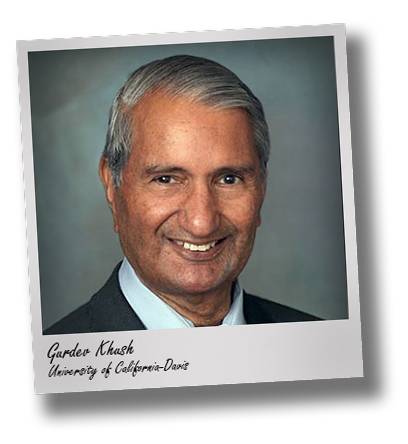Plant and soil science seminar series features geneticist Gurdev Khush
By: Norman Martin
Gurdev Khush, an adjunct professor of plant sciences at the University of California-Davis, a member of the National Academy of Sciences and a fellow of the Royal Society of London, delivered a colloquium lecture today (Nov. 29) at the Hall of Nations in the International Cultural Center at Texas Tech.

The internationally renowned geneticist and plant breeder whose work ensured the stability of the global rice supply discussed, "Food Security for Ten Billion People: Perspectives from the Architect of the First Green Revolution in Rice."
During his talk, Khush highlighted the benefits of modern technology, genetics and breeding efforts that have helped the world. Remarkable developments in agriculture have enabled the world's poverty level to drastically reduce from 37 percent in 1990 to 12.8 percent in 2015.
In speaking about new technology and its adaptation, Khush said relaying correct information to the public is important, as misinformation may be misleading, particularly regarding GMOs. Strategies for enhancing agricultural productivity should focus on increasing the yield ceiling and closing the yield gap. Genomic approaches must be carefully adopted to improve the farm sector. Citing China as an example, he noted how hybrid breeding has enabled China to enhance its rice yield by 20 percent. In addition a cotton revolution, which has taken place in India, is due to both hybrid and the adaptation of GMO seeds.
Khush is credited with the development of semi-dwarf, high-yielding varieties of rice and, in the 1980s, pioneered the use of modern biotechnological approaches in rice breeding. That led to a 30-year period in which food production was doubled and helped prevent famine and land degradation as the world population exploded in the 1960s.
After joining the International Rice Research Institute in 1967, Khush played a key role in developing more than 300 varieties of rice in the race to keep production ahead of population growth. He has spent more than 30 years directing both fundamental and applied-genetic research and the delivery of rice varieties to underserved populations. His body of work earned the World Food Prize (1996) and the Japan Food Price (1987).
He led the Division of Plant Breeding, Genetics and Biochemistry during his tenure at IRRI. He also is a recipient of the Wolf Prize from Israel and Rank Prize from the United Kingdom.
CONTACT: Eric Hequet, Department Chair, Department of Plant and Soil Science, Texas Tech University at (806) 742-2838 or eric.hequet@ttu.edu
1129NM18
Davis College NewsCenter
-
Address
P.O. Box 42123, Lubbock, Texas 79409-2123, Dean's Office Location:Goddard Building, Room 108 -
Phone
(806)742-2808 -
Email
kris.allen@ttu.edu
